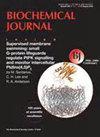癌症中的表观遗传学和替代剪接:老对手,新视角。
IF 4.4
3区 生物学
Q2 BIOCHEMISTRY & MOLECULAR BIOLOGY
引用次数: 0
摘要
近年来,我们在概念理解和技术能力方面都取得了长足进步,从而提高了对癌症发生和发展的基本因素的认识。虽然我们对致癌的分子机制有了深入的了解,但却忽略了与遗传学协同作用的表观遗传学途径所做出的重要贡献。越来越多的证据表明,癌症是遗传学和表观遗传学之间复杂的相互作用。值得注意的是,表观遗传因子在调控替代性前核糖核酸剪接方面起着关键作用,而这种剪接是导致蛋白质多样性的主要因素。在这篇综述中,我们详细介绍了表观遗传修饰因子与替代剪接之间的双向交流,并举例说明了受影响的特定基因和同工酶。值得注意的是,本综述还简明扼要地讨论了以表观遗传调节因子为靶点以及表观遗传组编辑这一新兴领域在调节剪接模式方面的潜力。总之,这篇综述对癌症中表观遗传学和替代剪接之间错综复杂的相互作用提供了宝贵的见解,为了解和靶向这一关键过程的新方法铺平了道路。本文章由计算机程序翻译,如有差异,请以英文原文为准。
Epigenetics and alternative splicing in cancer: old enemies, new perspectives.
In recent years, significant strides in both conceptual understanding and technological capabilities have bolstered our comprehension of the factors underpinning cancer initiation and progression. While substantial insights have unraveled the molecular mechanisms driving carcinogenesis, there has been an overshadowing of the critical contribution made by epigenetic pathways, which works in concert with genetics. Mounting evidence demonstrates cancer as a complex interplay between genetics and epigenetics. Notably, epigenetic elements play a pivotal role in governing alternative pre-mRNA splicing, a primary contributor to protein diversity. In this review, we have provided detailed insights into the bidirectional communication between epigenetic modifiers and alternative splicing, providing examples of specific genes and isoforms affected. Notably, succinct discussion on targeting epigenetic regulators and the potential of the emerging field of epigenome editing to modulate splicing patterns is also presented. In summary, this review offers valuable insights into the intricate interplay between epigenetics and alternative splicing in cancer, paving the way for novel approaches to understanding and targeting this critical process.
求助全文
通过发布文献求助,成功后即可免费获取论文全文。
去求助
来源期刊

Biochemical Journal
生物-生化与分子生物学
CiteScore
8.00
自引率
0.00%
发文量
255
审稿时长
1 months
期刊介绍:
Exploring the molecular mechanisms that underpin key biological processes, the Biochemical Journal is a leading bioscience journal publishing high-impact scientific research papers and reviews on the latest advances and new mechanistic concepts in the fields of biochemistry, cellular biosciences and molecular biology.
The Journal and its Editorial Board are committed to publishing work that provides a significant advance to current understanding or mechanistic insights; studies that go beyond observational work using in vitro and/or in vivo approaches are welcomed.
Painless publishing:
All papers undergo a rigorous peer review process; however, the Editorial Board is committed to ensuring that, if revisions are recommended, extra experiments not necessary to the paper will not be asked for.
Areas covered in the journal include:
Cell biology
Chemical biology
Energy processes
Gene expression and regulation
Mechanisms of disease
Metabolism
Molecular structure and function
Plant biology
Signalling
 求助内容:
求助内容: 应助结果提醒方式:
应助结果提醒方式:


